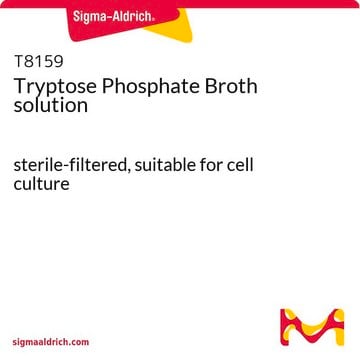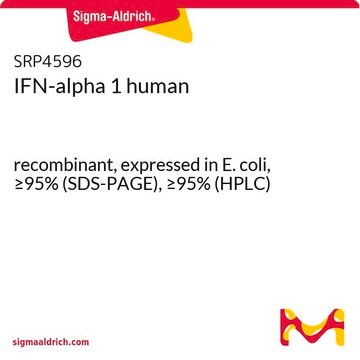T9157
Tryptose Phosphate Broth
suitable for insect cell culture
Sinonimo/i:
Tryptose Broth
Autenticatiper visualizzare i prezzi riservati alla tua organizzazione & contrattuali
About This Item
Codice UNSPSC:
41106507
NACRES:
NA.73
Prodotti consigliati
Origine biologica
bovine milk
Stato
solid
tecniche
cell culture | insect: suitable
Condizioni di spedizione
ambient
Temperatura di conservazione
room temp
Descrizione generale
Tryptose Phosphate Broth (TPB) comprises pyrimidine based components and is crucial for pyrimidine synthesis and electron transport chain in cells. In chick embryo fibroblast, it alleviates chloramphenicol inhibition.
Applicazioni
In addition to its use for the growth of fastidious micro-organisms, Tryptose Phospate Broth (TPB) has been studied as supplement for the preparation of media that supports vaccine production in BHK-21 cells and the growth of SF21 insect cells in high-density perfusion culture stirred-tank bioreactors.
Tryptose Phosphate Broth has been used as a supplement:
- in Eagle′s minimum essential medium alpha for growing Vero cells
- for Vero-CCL81 cells in porcine epidemic diarrhea coronavirus propagation
- in Dulbecco modified Eagle medium in LR7cells for mouse hepatitis virus propagation
- in Glasgow minimum essential medium (GMEM) for Madin-Darby canine kidney (MDCK) cells.
Componenti
Tryptose Phosphate Broth (TPB) is composed of four components: Tryptose (20g/L); Dextrose (2g/L); NaCl (5g/L) and Disodium Phosphate (2.5g/L) typically adjusted to pH 7.3. The tryptose component is a peptone (mixture of amino acids and short peptides) derived by the mixed enzymatic hydrolysis (pancreatic enzymes) of the milk protein casein. This hydrolysate provides a source of amino acid based nutrients and survival factors that support the growth of fastidious micro-organisms such as Brucella, Streptococcus, and Neisseria; as well as eukaryotic cells such as insect and animal cells. Dextrose provides a fermentable carbohydrate that can be used by fastidious mico-organisms. Sodium chloride maintains the osmotic and ionic equilibrium and disodium phosphate provides the basic buffering capacity.
Comunemente ordinati con questo prodotto
N° Catalogo
Descrizione
Determinazione del prezzo
Prodotto comparabile
Codice della classe di stoccaggio
11 - Combustible Solids
Classe di pericolosità dell'acqua (WGK)
WGK 3
Punto d’infiammabilità (°F)
Not applicable
Punto d’infiammabilità (°C)
Not applicable
Dispositivi di protezione individuale
Eyeshields, Faceshields, Gloves, type P3 (EN 143) respirator cartridges
Scegli una delle versioni più recenti:
Certificati d'analisi (COA)
Lot/Batch Number
Non trovi la versione di tuo interesse?
Se hai bisogno di una versione specifica, puoi cercare il certificato tramite il numero di lotto.
Possiedi già questo prodotto?
I documenti relativi ai prodotti acquistati recentemente sono disponibili nell’Archivio dei documenti.
I clienti hanno visto anche
Aminopeptidase N is not required for porcine epidemic diarrhea virus cell entry
Li W, et al.
Virus Research, 235, 6-13 (2017)
Phytochemical analysis and in-vitro screening of selected Indian medicinal plants for antiviral activity against highly pathogenic avian influenza virus
Sood R, et al.
Spatula DD, 3(3), 81-88 (2013)
Identification and characterization of a proteolytically primed form of the murine coronavirus spike proteins after fusion with the target cell
Wicht O, et al.
Journal of Virology, 88(9), 4943-4952 (2014)
Tryptose phosphate broth improves Rickettsia felis replication in mammalian cells
Saisongkorh W, et al.
FEMS Immunology and Medical Microbiology, 64(1), 111-114 (2012)
Azali Azlan et al.
PLoS neglected tropical diseases, 15(1), e0008351-e0008351 (2021-01-23)
The Asian tiger mosquito, Aedes albopictus (Ae. albopictus), is an important vector that transmits arboviruses such as dengue (DENV), Zika (ZIKV) and Chikungunya virus (CHIKV). Long noncoding RNAs (lncRNAs) are known to regulate various biological processes. Knowledge on Ae. albopictus
Il team dei nostri ricercatori vanta grande esperienza in tutte le aree della ricerca quali Life Science, scienza dei materiali, sintesi chimica, cromatografia, discipline analitiche, ecc..
Contatta l'Assistenza Tecnica.
















